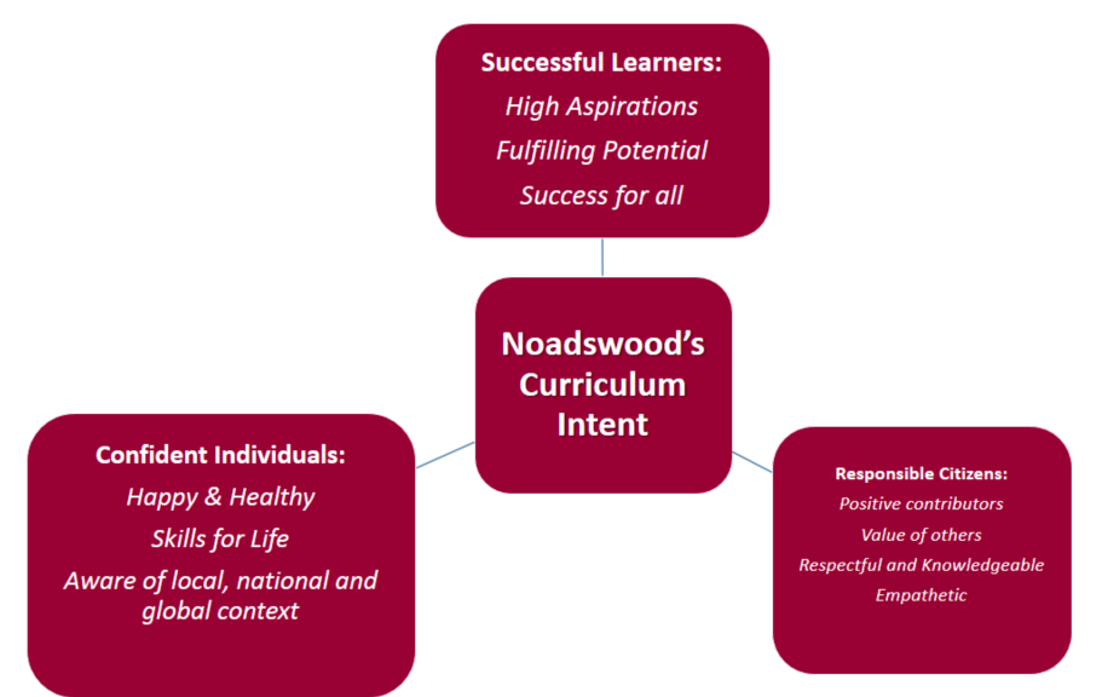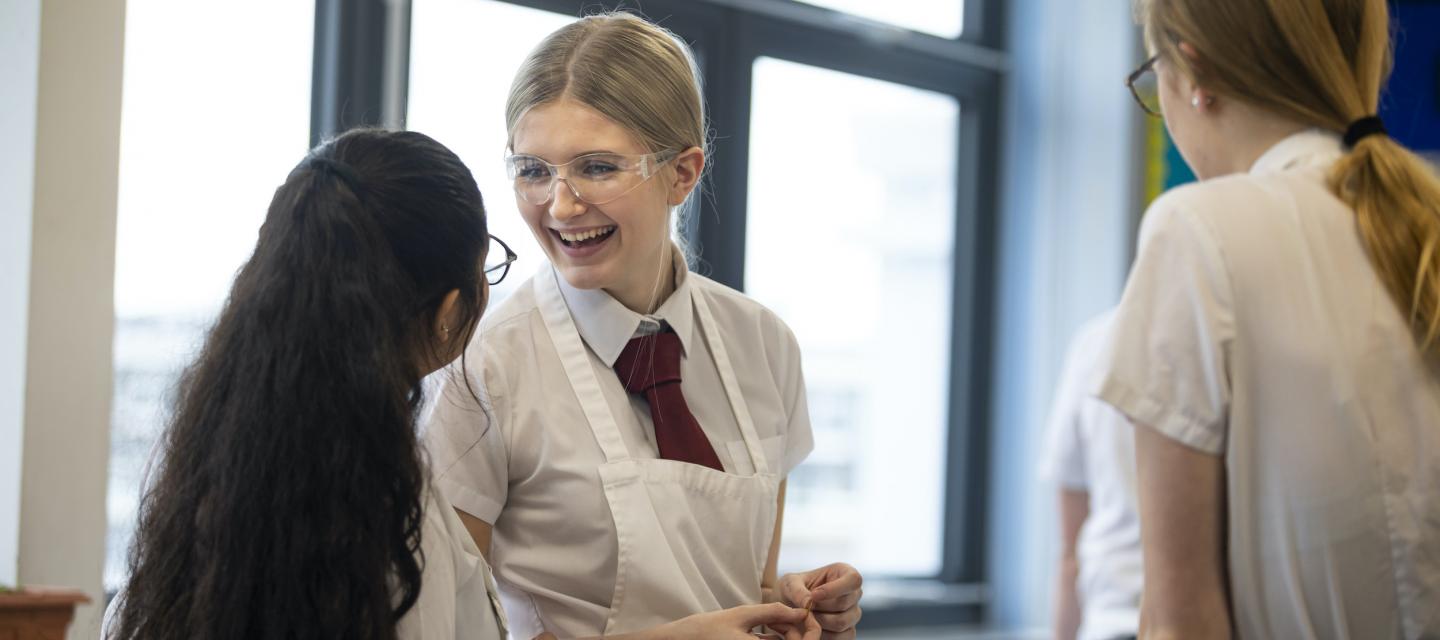'Through excellent teaching and meaningful partnerships, we provide a sustainable and exciting environment, so that pupils are successful in reaching their potential as learners and citizens’
At Noadswood, the curriculum is so much more than that which is delivered in lessons. The Noadswood curriculum is everything that students experience during their time in and out of school. In order for students to unlock their potential, we strive to provide opportunities for young people to improve their personal resilience, adaptability and perseverance. It is important that we all understand our responsibility to contribute constructively and sensitively within our community locally, nationally and globally both as individuals and collectively.
Our curriculum is one of entitlement where every student is provided with opportunities to grapple with ‘the best that has been thought and said’ so that they learn to appreciate the best in human creativity and achievement. We encourage young people to question what they learn so as to enhance deeper understanding and a desire for further learning. We expect our students to be Ready to engage with their learning, Respectful of all those around them and to approach their participation in school in a Safe manner.
The taught curriculum is designed so that young people can develop a real curiosity in the world around them, build their knowledge and hone their skills in a broad range of disciplines so that they are well equipped for life in the world of further education, employment and citizenship. The absolute best is achieved when students enjoy the guidance that is provided in school while realising their own desire and determination to reach their potential.

The Noadswood curriculum has been arranged by Key Stage: Key Stage 3 is organised across years 7 and 8 this allows for a three-year process for Key Stage 4. This has allowed us to maintain real breadth at Key Stage 4 in the light of the much more demanding GCSE courses that students are required to study. Year 9 provides students with a more in-depth grounding in their chosen ‘option’ subjects. The curriculum design also allows us the opportunity to mix academic qualifications with vocational courses to best suit our students. However, since 2020, in order to maintain a real breadth of entitlement in Key Stage 3, year 9 pupils now continue to study the full range of national curriculum subjects.
Going forwards year 9 students choose four preferred qualifications to study alongside the core subjects in KS4. Parents are encouraged to support their children through this process although the school can provide a good deal of advice. We will often consider which subjects will best suit the needs of the individual pupil. The school’s VLE and the evening events are vital sources of information for students and parents alike. The new 2020 curriculum is designed to encourage and increase the number of students who choose to follow the most ambitious curriculum with more students following a full suite of EBacc subjects.
In KS4 students will have chosen four subjects from the pool of more than 20 GCSEs and BTEC level 1 and 2 qualifications. Alongside these courses, all students will study English Language, English Literature, Mathematics and Double Award Science. They are also following courses in Religious Education, Physical Education as well as Citizenship+ (citizenship, RSE (Relationships and Sex Education), PSHE and careers). Some students will be able to study GCSE statistics or the FSMQ or Chemistry, Physics and Biology (rather than Combined Science).
Our curriculum at KS3 and 4 is a curriculum of entitlement. Every student is entitled to access every part of the school curriculum in line with the Equality Act 2010 and the Educational Needs and Disability Regulations 2014.
All subjects and courses are offered to all students irrespective of cultural heritage, starting points or educational needs. Personalised advice, information and guidance is provided but student choice remains paramount. All specialist teaching spaces are accessible to all on our campus.
Please visit the subjects below to find our more information about each, including bespoke frequently asked questions. And if you require any further information, please do just get in contact with us.
KS4 Curriculm Courses
Art and Design | AQA GCSE – website link (click) |
Art and Design (BTEC) | Pearson BTEC – website link (click) |
Child Development | Pearson BTEC – website link (click) |
Computer Science | OCR GCSE – website link (click) |
| Citizenship | AQA GCSE – website link (click) |
Dance | Pearson BTEC – website link (click) |
Design and Technology | EdExcel GCSE – website link (click) |
Digital iMedia | Cambridge National – website link (click) |
Drama | AQA GCSE – website link (click) |
English Language | AQA GCSE – website link (click) |
English Literature | AQA GCSE – website link (click) |
Food Preparation and Nutrition | Eduquas GCSE – website link (click) |
Geography | AQA GCSE – website link (click) |
Health and Social Care | OCR BTEC – website link (click) |
History | AQA GCSE – website link (click) |
Mathematics | EdExcel GCSE – website link (click) |
Media Studies | WJEC GCSE – website link (click) |
MFL – French | AQA GCSE – website link (click) |
MFL – German | AQA GCSE – website link (click) |
Music | EdExcel GCSE – website link (click) |
Music (BTEC) | Pearson BTEC – website link (click) |
Science - Biology | AQA GCSE – website link (click) |
Science – Chemistry | AQA GCSE – website link (click) |
Science – Physics | AQA GCSE – website link (click) |
Science – Combined | AQA GCSE – website link (click) |
Sports Studies | Cambridge National – website link (click) |
Noadswood Curriculum Philosophy
"The curriculum is a never-ending story." (Mary Myatt)
Professional development to support curriculum intent, implementation and impact:
| Focus of the Session: |
Geoff Barton | “Don’t Call it Literacy.” The importance of literacy in unlocking the curriculum. |
Steve Rollett | The ‘why’ of curriculum and the importance of a knowledge rich and ambitious curriculum. |
Mary Myatt | “Concepts, Conversations and Conversations.” We explored the theme of high challenge, low threat as well as the 3 I’s of the Ofsted framework.
|
John Blake | Coherent Curriculum Programmes |
Alex Quigley | Developing Disciplinary Literacy |
Jon Hutchinson | Five Best Bets within the Classroom. |
Christine Counsell | SLT and their role in curriculum leadership and development |
John Tomsett | “Huh?” Better Curriculum Conversations. |
In addition to this colleagues have attended the Tom Sherrington 'Curriculum Masterclasses" in order to explore collaboratively areas pertinent to their curriculum areas. We have facilitated opportunities for all departments to engage in their subject communities and subject specific CPD.
To support the ongoing development of curriculum, we are delighted to be hosting two speakers who will build on our work:
Jeffrey Boakye who will be leading 3 twilights in 2022/23 on:
- An introduction to race and racism
- Understanding ideology in the Curriculum
- Decolonising the Curriculum
Tom Sherrington: Can we teach to the top AND secure mastery?
This session explores the apparent tensions between notions of stretch and challenge and an inclusive curriculum where no child is left behind.
Further curriculum development:
In addition to this, we are exploring the book "Teaching to the Top" by Megan Mansworth to ensure that we are aiming higher for every learner in our Monday staff briefings. We are also allocating all departments throughout 2022/23 a dedicated day off timetable to reflect, review and refine their curriculums as well as more dedicated curriculum time in our school calendar. We are excited to be working in partnership with our neighbours Orchard Infant and Orchard Junior School in 2022/23 to examine the 'all through' journey from KS1-4 in our schools within Science, Design and Technology, History and Geography.

















